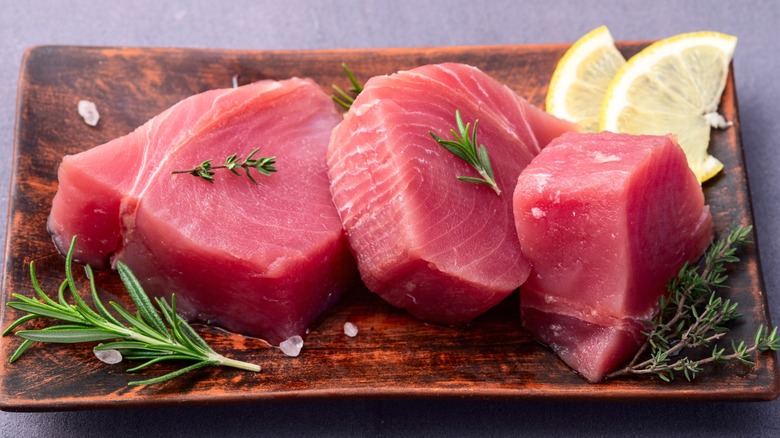You're Probably Flavoring Tuna Steaks Completely Wrong — Here's The Easy Fix
For seafood lovers, tuna steak is akin to a premium cut of beef. You can even cook tuna like a beef steak, as long as it's watched with a careful eye — but the similarities tend to end there. You don't have to let tuna steaks rest before eating them (which is essential when cooking beef), and seasoning them to perfection doesn't require much (celebrity chef Andrew Zimmern only seasons grilled tuna steaks with salt). As for marinating the fish like many meat recipes call for, it's not entirely necessary, according to the research and development chef at Pappas Restaurants, Inc., Jason Ryczek.
"I typically don't marinate tuna steaks," Ryczek said. "Tuna can be marinated, but if it's a good quality tuna, you will not have to marinate it long," he added. Ryczek explained that allowing it to soak up a marinade for too long can wreck the delicate texture of the seafood. "Protein typically breaks down once it's introduced to salt and acid," he explained. "Simply seasoning them right before cooking allows the tuna to shine," he suggested as an alternative.
Of course, that's not to say that marinating the fish is always a mistake, but like many other culinary concepts, timing is everything. If you choose to marinate a tuna steak, it should only be sitting in that salt and acid long enough to take on a bit of flavor. "The goal is to ensure the marinade only penetrates as deeply as you want it to cook," Ryczek said.
You can marinate tuna steaks after searing them
Although Jason Ryczek avoids marinating tuna steaks most of the time, now and then, it's nice to mix things up in the kitchen. Sometimes he opts to bestow extra flavors to the seafood in a somewhat counterintuitive way. Ryczek prefers to use a popular Japanese technique for cooking meat and fish called tataki. "I don't do it often, but I enjoy the tataki method of lightly cooking the exterior of the tuna loin or steak and submerging it in a soy-based marinade so that it absorbs the flavors while it rests," he said.
Tataki dishes aren't always marinated after searing — sometimes sauce is poured over the protein or simply served on the side. But by letting the fish have a little soak after it's been seared, Ryczek said, "It's almost like a reverse marinade." Still, just as when marinating a tuna steak before it's cooked, it doesn't take long. Ryczek noted, "It usually only sits in the marinade for a short while."

